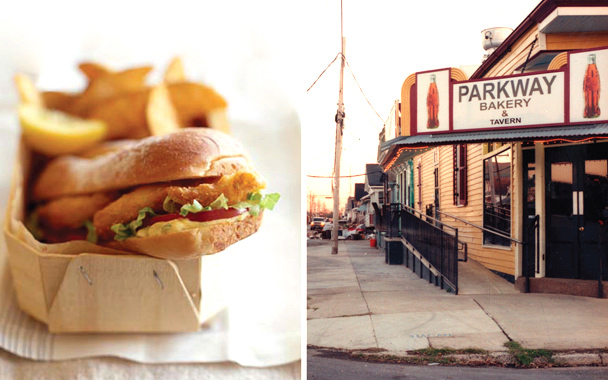You tell ’em how the catfish is, Harry,” Justin Kennedy said to the man sitting by the window, his hands barely wrapping themselves around an enormous sandwich. “Harry,” Justin explained to me, “is here all the time. He always gets the catfish.”
Harry looked over to us, clearly put upon, and gave me a meager thumbs-up, not as a half-hearted endorsement, but in the way that someone who eats the same sandwich every day is probably a little socially awkward. He turned back to his catfish po’ boy, relieved that was over, and my friend and I were left again to the task of deciding what to order.
We came to the Parkway Tavern, a bar and po’ boy shop in New Orleans, on a friend’s recommendation. I’ve eaten lots of po’ boys on recommendation over the last couple of years, and I have to confess that I didn’t always understand them. Po’ boys are an integral part of the New Orleans and Gulf Coast food culture, but I wondered what it was that actually made them special. I don’t always love the bread, which tends to be thin-crusted and fluffy inside, prone to getting stale. Ordering them “dressed” means getting them with lettuce, tomatoes, pickles, and mayonnaise, which is nice, but hardly revelatory.
Out came our shrimp and corned beef po’ boys. The shrimp were perfectly fried, fresh from the Gulf, and chewy in a great, meaty way. The corned beef was unctuous and deeply flavored. These were great sandwiches. But it was after we ate, when we struck up a conversation with Justin, that I realized that I’d had it all wrong about the po’ boy.
Two years ago, in the December after the storm, Justin left his school career behind to help his uncle reopen the Parkway—mucking it out, cleaning it up, and then cooking, tending bar, managing the shop, and getting to know guys like Harry. He takes it seriously, doing things like introducing a new kind of corned beef, brined to his specifications by the Parkway’s butcher, and cooking it in-house. When I asked about it, he took me out to show me the briskets in their brine, and for good measure, the enormous oven they have running 24/7 to supply the 1,500 pounds of roast beef they move a week.
Both as I ate and as we talked, the care and pride he takes in his work was apparent. And then I thought back to the po’ boy bread, which, to be fair, is pretty good at the Parkway. But whether it matches your idea of what perfect bread is, that’s rather beside the point. It’s a style thing, and a style that has taken deep root in the culture. The food culture here is distinct. It has felt—rather than strictly defined or delineated—parameters, and therefore has a deep emotional resonance. What matters is that the people of this part of the world like their bread like that. They care about it. It’s not that the po’ boy is necessarily a totally unique or a totally delicious thing. It’s that the people who make it and eat it have a pride in it; it connects them to who they feel they are as a people.


